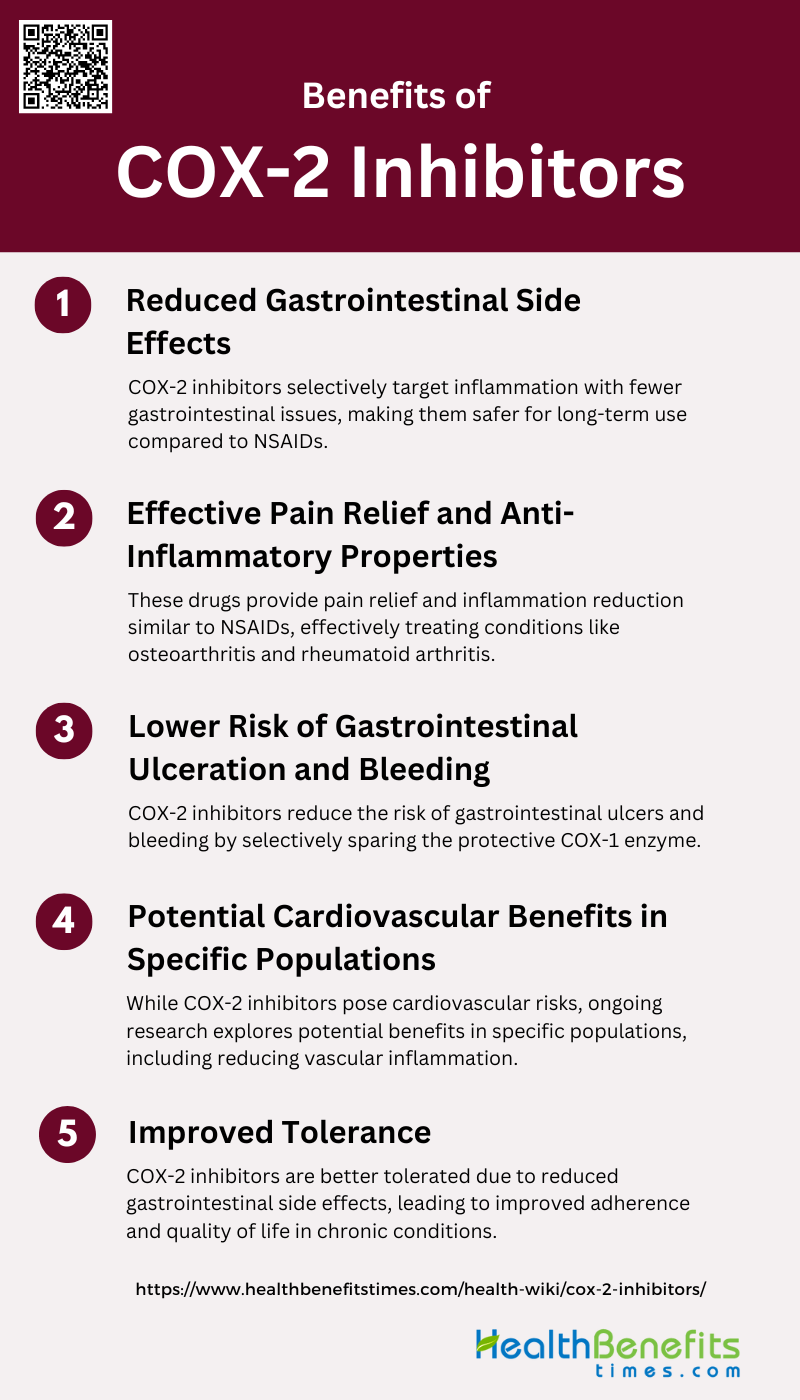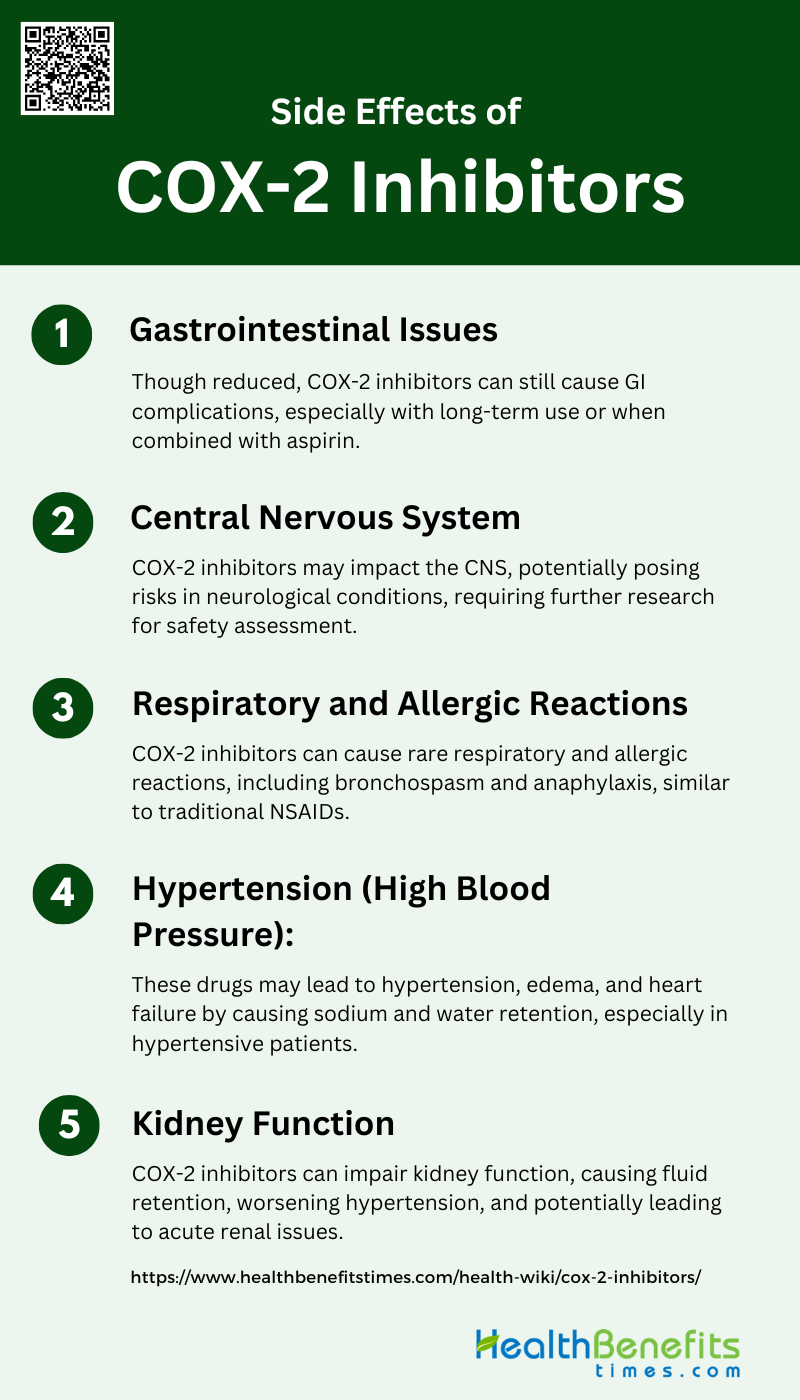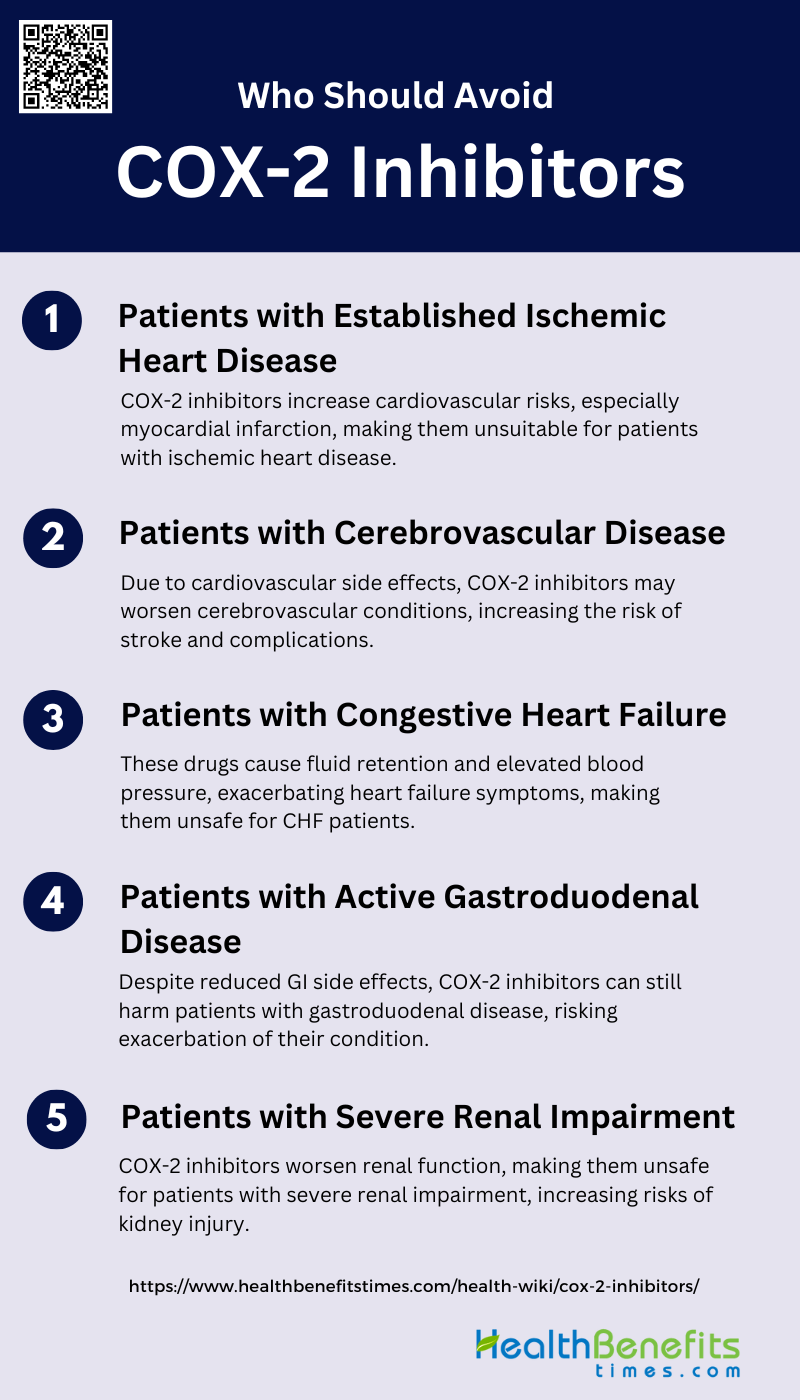COX-2 inhibitors are a class of non-steroidal anti-inflammatory drugs (NSAIDs) designed to selectively block the cyclooxygenase-2 (COX-2) enzyme, which is primarily responsible for the production of pro-inflammatory prostanoids. Unlike traditional NSAIDs, which inhibit both COX-1 and COX-2 enzymes, COX-2 inhibitors aim to reduce inflammation and pain while minimizing gastrointestinal side effects typically associated with COX-1 inhibition. These inhibitors have been shown to be effective in treating various inflammatory conditions and are often used in managing pain and inflammation associated with arthritis and other chronic conditions. However, despite their benefits, COX-2 inhibitors have been associated with increased cardiovascular risks, such as myocardial infarction and vascular deaths, which has led to careful consideration of their use in clinical settings. The development of newer COX-2 inhibitors continues, with a focus on improving their safety profile while maintaining their therapeutic efficacy.
Uses of COX-2 Inhibitor
COX-2 inhibitors are a class of drugs that specifically target the cyclooxygenase-2 enzyme, which plays a key role in inflammation and pain. These inhibitors are commonly used to manage various medical conditions due to their effectiveness in reducing pain and inflammation with fewer gastrointestinal side effects compared to traditional NSAIDs. Below are some of the primary uses of COX-2 inhibitors:
1. Pain Management
COX-2 inhibitors are widely used for pain management due to their ability to selectively inhibit the cyclooxygenase-2 enzyme, which is primarily responsible for the production of prostaglandins involved in pain and inflammation. Unlike traditional nonsteroidal anti-inflammatory drugs (NSAIDs), COX-2 inhibitors offer the advantage of reducing pain without causing significant gastrointestinal side effects, such as gastric ulceration, which are commonly associated with nonselective NSAIDs. This makes COX-2 inhibitors a preferred choice for managing chronic pain conditions, including osteoarthritis and rheumatoid arthritis, where long-term medication use is often necessary.
2. Inflammation Reduction
COX-2 inhibitors play a crucial role in reducing inflammation by specifically targeting the COX-2 enzyme, which is induced by inflammatory stimuli such as cytokines. This enzyme is responsible for the production of pro-inflammatory prostaglandins that contribute to the pain and swelling associated with inflammation. By selectively inhibiting COX-2, these drugs effectively reduce inflammation without affecting COX-1, which is involved in protecting the stomach and kidneys. This selective action minimizes the risk of gastrointestinal and renal side effects, making COX-2 inhibitors a safer option for long-term inflammation management.
3. Dysmenorrhea
Dysmenorrhea, or painful menstrual cramps, is another condition where COX-2 inhibitors have shown significant efficacy. The pain associated with dysmenorrhea is largely due to the production of prostaglandins in the uterine lining, which cause uterine contractions and inflammation. COX-2 inhibitors reduce the production of these prostaglandins, thereby alleviating pain and discomfort. Their selective action ensures that the therapeutic benefits are achieved without the gastrointestinal side effects commonly seen with nonselective NSAIDs, making them a suitable option for women suffering from this condition.
4. Colorectal Polyps
COX-2 inhibitors have shown promising results in the prevention and treatment of colorectal polyps, particularly in patients with familial adenomatous polyposis (FAP). Studies have demonstrated that COX-2 is overexpressed in colorectal cancer tissues and is involved in tumorigenesis. The use of COX-2 inhibitors, such as celecoxib, has been effective in reducing the number and size of polyps in both animal models and human patients with FAP. This has led to the approval of celecoxib for the treatment of FAP by the US Food and Drug Administration. Ongoing research continues to explore the potential of COX-2 inhibitors in broader colorectal cancer prevention and treatment strategies.
Mechanism Action of COX-2 Inhibitors
Explanation of COX-2 Enzyme
Cyclooxygenase-2 (COX-2) is an inducible enzyme that plays a crucial role in mediating inflammatory responses and pain mechanisms. Unlike COX-1, which is constitutively expressed and involved in maintaining physiological functions such as protecting the gastric mucosa, COX-2 is primarily induced during inflammatory processes or in cancerous tissues. This enzyme catalyzes the conversion of arachidonic acid to prostaglandins, which are lipid compounds that contribute to inflammation, pain, and fever. Due to its specific induction during pathological conditions, COX-2 has become a significant target for anti-inflammatory and analgesic drug development.
How Inhibitors Target COX-2 Specifically
Selective COX-2 inhibitors, also known as coxibs, are designed to specifically target the COX-2 enzyme without affecting COX-1. This selectivity is achieved through structural modifications that allow the inhibitors to fit into the active site of COX-2 but not COX-1. For instance, the presence of bulky hydrophobic groups in the inhibitors can enhance their selectivity for COX-2 by fitting into a side pocket unique to the COX-2 enzyme. Additionally, the kinetic mechanisms of these inhibitors often involve multiple reversible steps, which contribute to their high selectivity and potency. These structural and kinetic properties enable the inhibitors to effectively block COX-2 activity, thereby reducing inflammation and pain without causing gastrointestinal side effects associated with COX-1 inhibition.
Benefits of Selective Inhibition
The primary benefit of selective COX-2 inhibition is the reduction of gastrointestinal (GI) side effects commonly associated with non-selective non-steroidal anti-inflammatory drugs (NSAIDs) like aspirin and ibuprofen. By specifically targeting COX-2, these inhibitors avoid disrupting the protective prostaglandins produced by COX-1 in the stomach lining, thereby minimizing the risk of GI tract damage and hepatotoxicity. Additionally, selective COX-2 inhibitors have shown potential in reducing the risk of certain cancers and in managing other conditions like Alzheimer’s and Parkinson’s diseases. However, it is important to note that some COX-2 inhibitors have been associated with cardiovascular risks, necessitating careful patient selection and monitoring during treatment.
Benefits of COX-2 Inhibitors
COX-2 inhibitors offer several advantages over traditional nonsteroidal anti-inflammatory drugs (NSAIDs) by specifically targeting the COX-2 enzyme responsible for inflammation and pain. This selective inhibition results in fewer gastrointestinal side effects, making them a safer option for long-term use. Below are some of the key benefits of COX-2 inhibitors:
1. Reduced Gastrointestinal Side Effects
Selective COX-2 inhibitors were developed to address the gastrointestinal (GI) toxicity associated with traditional nonsteroidal anti-inflammatory drugs (NSAIDs). Traditional NSAIDs inhibit both COX-1 and COX-2 enzymes, leading to reduced prostaglandin synthesis, which can cause GI damage and bleeding. In contrast, COX-2 inhibitors selectively target the COX-2 enzyme, which is primarily involved in inflammation and pain, while sparing COX-1, which protects the stomach lining. This selective inhibition results in fewer GI side effects, making COX-2 inhibitors a safer option for long-term use in patients requiring chronic pain management.
2. Effective Pain Relief and Anti-Inflammatory Properties
COX-2 inhibitors are effective in providing pain relief and reducing inflammation, similar to traditional NSAIDs. These inhibitors work by blocking the COX-2 enzyme, which is induced during inflammatory processes and is responsible for the production of pro-inflammatory prostaglandins. This mechanism makes COX-2 inhibitors particularly useful in treating conditions such as osteoarthritis and rheumatoid arthritis, where inflammation plays a key role in symptomatology. Studies have shown that COX-2 inhibitors offer comparable efficacy to traditional NSAIDs in managing pain and inflammation, making them a valuable therapeutic option.
3. Lower Risk of Gastrointestinal Ulceration and Bleeding
One of the significant advantages of COX-2 inhibitors over traditional NSAIDs is their lower risk of causing gastrointestinal ulceration and bleeding. Traditional NSAIDs inhibit both COX-1 and COX-2 enzymes, leading to a reduction in protective gastric prostaglandins and an increased risk of GI complications. In contrast, COX-2 inhibitors selectively inhibit the COX-2 enzyme, preserving the protective effects of COX-1-derived prostaglandins in the stomach. This selective inhibition results in a substantially lower incidence of GI ulcers and bleeding, making COX-2 inhibitors a safer choice for patients at risk of GI complications.
4. Potential Cardiovascular Benefits in Specific Populations
While COX-2 inhibitors have been associated with an increased risk of cardiovascular events, such as myocardial infarction and stroke, there is ongoing research to identify specific populations that may benefit from these drugs. For instance, dual COX-2 and 5-lipoxygenase (5-LOX) inhibitors have shown promise in reducing vascular inflammation and thrombosis, potentially offering cardiovascular benefits. Additionally, the use of low-dose aspirin as an adjuvant therapy may mitigate some of the cardiovascular risks associated with COX-2 inhibitors. Further studies are needed to better understand the cardiovascular risk profiles and potential benefits in specific patient populations.
5. Improved Tolerance
COX-2 inhibitors generally exhibit improved tolerance compared to traditional NSAIDs, primarily due to their reduced gastrointestinal side effects. Patients who require long-term anti-inflammatory treatment often experience fewer GI complications, such as ulcers and bleeding, when using COX-2 inhibitors. This improved tolerance can lead to better adherence to treatment regimens and overall improved quality of life for patients with chronic inflammatory conditions. However, it is essential to monitor for potential cardiovascular risks and adjust treatment plans accordingly to ensure the safest and most effective use of COX-2 inhibitors.
Side Effects of COX-2 inhibitors
COX-2 inhibitors can still cause side effects. These side effects may include cardiovascular risks, kidney issues, and gastrointestinal problems, although they are generally less severe than those associated with traditional NSAIDs. Below is a list of potential side effects of COX-2 inhibitors:
1. Gastrointestinal Issues
COX-2 inhibitors were developed to minimize gastrointestinal (GI) side effects commonly associated with traditional nonsteroidal anti-inflammatory drugs (NSAIDs). Studies have shown that COX-2 inhibitors significantly reduce the risk of major GI events such as perforation, obstruction, and bleeding compared to NSAIDs combined with proton pump inhibitors (PPIs). However, the risk of dyspepsia remains higher with COX-2 inhibitors. Despite their reduced GI toxicity, COX-2 inhibitors can still cause GI complications, especially when used long-term or in combination with low-dose aspirin, which may delay ulcer healing and create an ulcerogenic effect.
2. Central Nervous System
The central nervous system (CNS) effects of COX-2 inhibitors are less well-documented compared to their gastrointestinal and cardiovascular impacts. However, COX-2 is constitutively expressed in the brain, particularly in the cortex, and its inhibition could potentially lead to adverse CNS effects. There is ongoing research into the role of COX-2 inhibitors in neurological diseases such as Parkinson’s and Alzheimer’s, suggesting that while they may offer therapeutic benefits, they also pose risks that need further investigation. The balance between therapeutic efficacy and potential CNS side effects remains a critical area of study.
3. Respiratory and Allergic Reactions
Respiratory and allergic reactions to COX-2 inhibitors are relatively rare but can occur. These reactions may include bronchospasm, urticaria, and anaphylaxis, similar to those seen with traditional NSAIDs. The selective inhibition of COX-2 does not entirely eliminate the risk of allergic reactions, as COX-2 inhibitors can still affect prostaglandin pathways involved in inflammatory and allergic responses. Patients with a history of NSAID-induced respiratory or allergic reactions should use COX-2 inhibitors with caution, and healthcare providers should monitor for any signs of hypersensitivity.
4. Hypertension (High Blood Pressure)
COX-2 inhibitors have been associated with the development of hypertension, edema, and congestive heart failure in a significant proportion of patients. These drugs can cause sodium and water retention, leading to increased blood pressure and edema, particularly in patients with pre-existing hypertension or cardiovascular conditions. The inhibition of COX-2 affects the synthesis of prostaglandins that help regulate blood pressure and renal function, thereby destabilizing blood pressure control in hypertensive patients. Careful monitoring and judicious use of COX-2 inhibitors are recommended to mitigate these risks.
5. Kidney Function
COX-2 inhibitors can adversely affect kidney function, similar to nonselective NSAIDs. They can cause salt and water retention, leading to edema and worsening hypertension, and can also result in acute declines in renal function and glomerular filtration rate. COX-2 is constitutively expressed in the kidney and plays a role in maintaining renal homeostasis, including sodium excretion and renal blood flow. The nephrotoxic potential of COX-2 inhibitors necessitates cautious use, especially in patients with chronic renal insufficiency, diabetes, or congestive heart failure, to reduce the incidence of adverse renal events.
Who Should Avoid COX-2 Inhibitors?
COX-2 inhibitors are not suitable for everyone and should be avoided by individuals with certain health conditions. People with a history of cardiovascular disease, gastrointestinal bleeding, or kidney problems should exercise caution or avoid these medications altogether. Below is a list of individuals who should avoid COX-2 inhibitors:
1. Patients with Established Ischemic Heart Disease
Patients with established ischemic heart disease should avoid COX-2 inhibitors due to their potential to increase cardiovascular risks. Studies have shown that COX-2 inhibitors can lead to a higher incidence of myocardial infarctions compared to placebo and naproxen. This increased risk is particularly concerning for individuals with pre-existing cardiovascular conditions, as the use of these medications can exacerbate their condition. Therefore, alternative pain management strategies should be considered for these patients to avoid the potential for adverse cardiovascular events.
2. Patients with Cerebrovascular Disease
Patients with cerebrovascular disease are also advised to avoid COX-2 inhibitors. The cardiovascular side effects associated with these drugs, such as increased blood pressure and fluid retention, can contribute to the worsening of cerebrovascular conditions. Given that cerebrovascular disease often involves compromised blood flow to the brain, the additional cardiovascular strain imposed by COX-2 inhibitors could lead to severe complications, including stroke. Therefore, safer alternatives should be sought for managing pain and inflammation in these patients.
3. Patients with Congestive Heart Failure
COX-2 inhibitors should be avoided in patients with congestive heart failure (CHF) due to their potential to cause fluid retention and exacerbate heart failure symptoms. These medications can lead to sodium and water retention, which can worsen edema and increase the workload on the heart. Additionally, COX-2 inhibitors have been associated with increases in blood pressure, further complicating the management of CHF. Therefore, the use of COX-2 inhibitors in patients with CHF should be carefully reconsidered, and alternative treatments should be explored.
4. Patients with Active Gastroduodenal Disease
Patients with active gastroduodenal disease should avoid COX-2 inhibitors due to their potential to cause gastrointestinal complications. Although COX-2 inhibitors are associated with fewer gastrointestinal side effects compared to traditional NSAIDs, they still pose a risk, especially in individuals with pre-existing gastrointestinal conditions. For patients with a high risk of peptic ulcer disease, a combination of a selective COX-2 inhibitor and a proton pump inhibitor (PPI) is recommended to minimize the risk of gastrointestinal complications. However, in cases of active gastroduodenal disease, it is prudent to avoid COX-2 inhibitors altogether to prevent exacerbation of the condition.
5. Patients with Severe Renal Impairment
Patients with severe renal impairment should avoid COX-2 inhibitors due to their potential to cause further renal dysfunction. COX-2 inhibitors, like other NSAIDs, can lead to declines in renal function, glomerular filtration rate, and cause salt and water retention, which can exacerbate renal issues. These effects are particularly concerning in patients with pre-existing renal conditions, as they can lead to acute kidney injury and worsen chronic kidney disease. Therefore, alternative pain management options should be considered for patients with severe renal impairment to avoid these adverse renal effects.
Alternatives to COX-2 Inhibitors
For those who cannot take COX-2 inhibitors, there are several alternative treatments available to manage pain and inflammation. These alternatives include traditional NSAIDs, acetaminophen, and non-pharmacological therapies such as physical therapy and acupuncture. Below is a list of alternatives to COX-2 inhibitors:
1. Other Types of NSAIDs
Nonsteroidal anti-inflammatory drugs (NSAIDs) are widely used for their analgesic and anti-inflammatory properties. Traditional NSAIDs, such as ibuprofen and naproxen, inhibit both COX-1 and COX-2 enzymes, which can lead to gastrointestinal and cardiovascular side effects. Selective COX-2 inhibitors, like celecoxib, were developed to reduce these side effects by specifically targeting COX-2, which is primarily involved in inflammation and pain. However, concerns about cardiovascular risks have led to the exploration of other NSAIDs with different selectivity profiles, such as diclofenac, which is as COX-2 selective as celecoxib but still carries cardiovascular risks.
2. Non-Drug Approaches for Pain Management
Non-drug approaches for pain management are gaining attention due to the side effects associated with NSAIDs and COX-2 inhibitors. Techniques such as physical therapy, acupuncture, and cognitive-behavioral therapy have shown efficacy in managing pain without the adverse effects of medications. Physical therapy can help improve mobility and reduce pain through exercises and manual techniques. Acupuncture has been found to release endorphins and improve pain thresholds. Cognitive-behavioral therapy helps patients manage pain by changing their perception and response to pain, thereby reducing its impact on daily life.
3. Lifestyle Changes and Dietary Options
Lifestyle changes and dietary options can play a significant role in managing inflammation and pain. Regular physical activity, weight management, and a balanced diet rich in anti-inflammatory foods can help reduce the need for NSAIDs and COX-2 inhibitors. Foods rich in omega-3 fatty acids, such as fish and flaxseeds, have anti-inflammatory properties. Antioxidant-rich fruits and vegetables can also help mitigate inflammation. Additionally, certain natural compounds, like flavonoids and terpenoids, have been identified as potential COX-2 inhibitors, offering a dietary approach to managing inflammation and pain.





